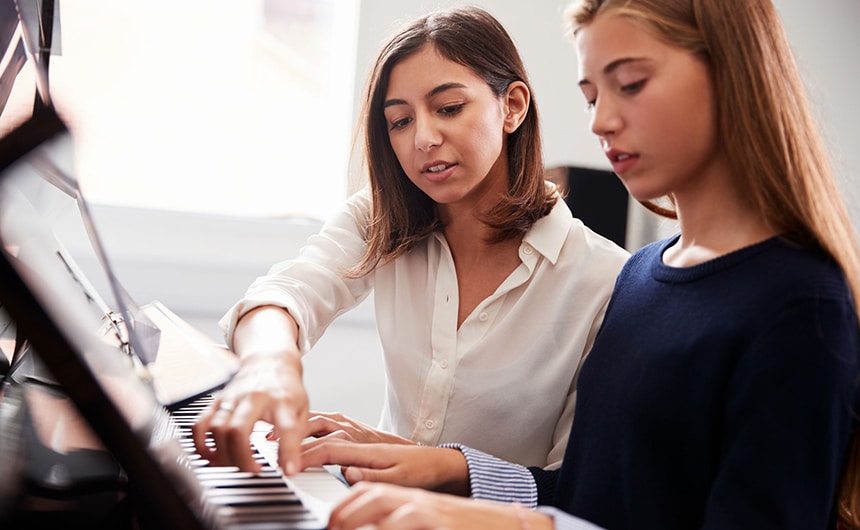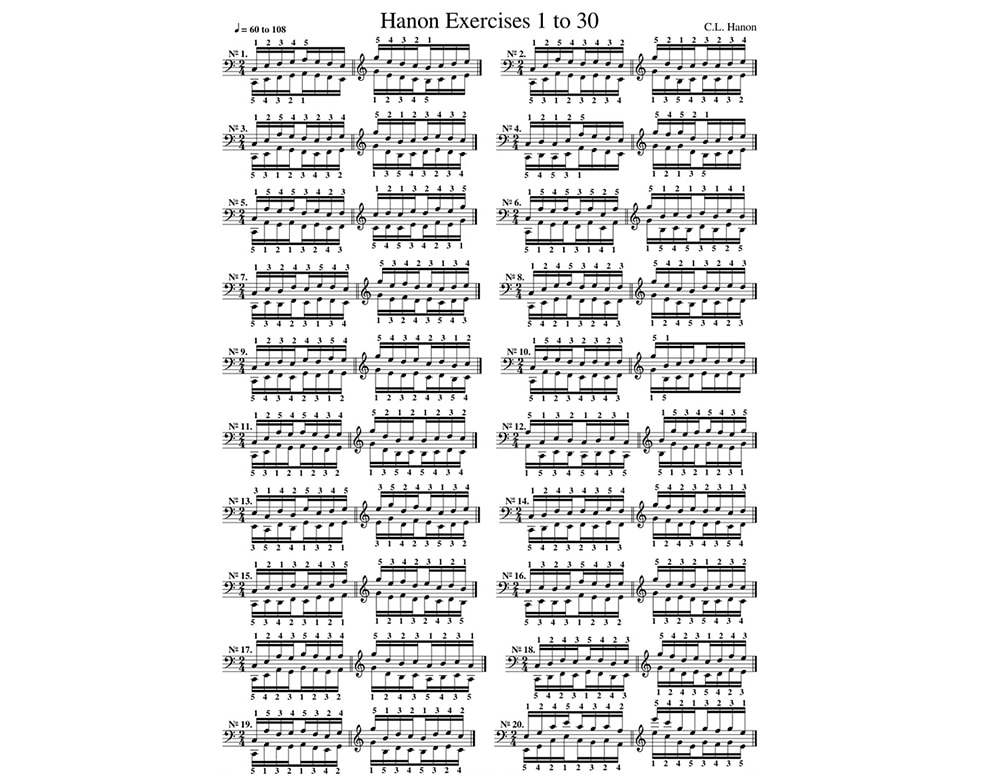Want to know how to learn piano fast? We’ve got you covered here. We’ll look at all the steps you can take to accelerate your learning and become comfortable playing the piano as soon as possible.
Bartolomeo Cristofori invented the piano at the turn of the 18th century. While the instrument has been modernized since then, the way to play it has pretty much stayed the same. It remains of the most popular instruments ever made and has been used in countless songs.
Trying to learn from being a complete novice can be challenging, especially if you’re not taking the proper steps. You need to know what you’re going for, set a plan in place, and practice in the right way. Here we’ll show you how to maximize your learning and minimize the time spent.
Let’s get started on how to learn the piano fast!

This is a tricky question to answer as everyone is going to be different. If you practice hard enough, it’s possible to get to a high level of proficiency in a matter of months. This generally involves practicing every day or nearly every day.
As with learning any new skill, your progress isn’t rapid. There are many different aspects to the piano, and you’ll also know how to read music, which can be difficult if you’ve never done it before.
You’ll also need to consider what level of proficiency you’re aiming for. Do you want to play along with your favorite songs? Perhaps you want to become a professional musician? Do you want to become a concert pianist? All of these will take different timescales.
Learning and practicing with patience are said to be essential by pianists. All the effort and time invested in learning piano will result in long-term success. Here we look at the best piano practice tips for you to remember.
Set time aside daily – You need to dedicate time to playing your piano; the more time you give it, the better. You should practice daily for at least 20 minutes. If you can’t play daily, try to do it as frequently as possible.
Warm-up beforehand – Why must you warm up when playing the piano?! Well, lousy posture and playing style can put pressure on your neck/shoulder, wrists, and fingers. It’s good to start your session with a stretch and then complete some piano warm-up exercises.
Don’t get ahead of yourself – Trying to do too much at the start will only get you down. Take on one task at a time and keep at it until you’re comfortable. It’s a good idea to set yourself goals and try and beat it. Don’t think you’ll be playing virtuoso solos right away.
Take it slow – Why should you take it slow when you want to learn fast? The reason is that it’s much easier to learn something slowly and correctly rather than fast or wrong. Being deliberate and slow with your practice means you’ll be able to master it sooner.
Visualize – Muscle memory isn’t a real thing. It’s just regular memory. If your brain knows what to do, then your muscles will follow. Visualization works as it helps to strengthen those memories and improve your proficiency. Visualize whenever you can, whether that is in bed, on a train, or on a bus. Practice keystrokes and think through for scales.
Learn songs you know – It’s a great idea to start by trying to play songs you’re familiar with. You’ll know the rhythm of the song, and it allows you to focus on your playing. You can learn quicker this way than with songs you barely know. Not only will you learn faster, but you’ll have more fun, which is always a motivator.
For most people, setting goals works. This could be with their jobs, at the gym, or when they’re learning to play the piano. Before you sit down to play, think about what you want to achieve in your practice session.
This could be practicing a major scale 10 times, learning to play the first four bars of a song, or playing through a song with no mistakes. It’s important to remember the level you’re at. You want to push yourself but not too hard that you get disheartened.
You also need to take into consideration the time you have. Set a goal that will take around 20 minutes to complete. If you want to practice more, you can repeat what you’ve done or move on to the next goal.
Keeping up motivation is vital when learning an instrument. Setting goals and then completing them gives you a sense of achievement. This, in turn, gives you a little buzz of happiness and keeps you focused.

We mentioned it briefly in the section above, but warm-ups are essential. Even expert performers will warm up before play. This is because it literally prepares their fingers and allows for the dexterity needed. It’s vital for beginners.
It’s good to start with physical warm-ups, and here is a small selection of what you can do:
Once you’ve done that, you can then focus on technical warm-ups. Common techniques are:
Repetition, repetition, repetition. It may seem tedious at times but doing the same thing repeatedly cements it into your brain. This is why it’s suggested that you practice every day. If you leave it for too long, you’ll begin to forget everything you’ve learned.
Along with playing daily, reading about techniques and theories from reliable sources is a great idea. The Piano Book for Adult Beginners by Damon Ferrante is one such example.
When you try and play fast, you end up hitting the wrong notes, which can sound like a mess. It’s tempting to do this, especially when trying to play a song. You want to play it at the regular tempo, but this is unrealistic initially.
It doesn’t matter how slow you play. It’s more important to get the notes right. The next time you do it, you’ll be able to play it more quicker. After a few times, you’ll find you’re now playing along at full speed.
Using a metronome will also help keep you on time. The beauty of using a metronome is that you can set it to whatever beats per minute (BPM) you want. It will train your brain to improve your timing and also allow you to set goals.
Another excellent learning technique is to listen along to a song and try to repeat it. This makes it easy to feel the rhythm of a song but will also teach you to pick up notes. Some modern digital pianos have a feature that allows you to play along with songs, and some apps are great.
Learning piano solos can be an enjoyable exercise. Learning a new song can sometimes become mind-numbing, going over the start of the song repeatedly. Solos are different and a good challenge. They are usually great for finder coordination and not too long, either. It helps to break up a song and give you something different to try.
Using each hand independently significantly increases your playing potential, but it’s complicated. Rather than trying to do it all at once, it’s better to practice using each hand separately. When you’re comfortable with both parts, you can then bring your hands together, starting with a slower tempo.
Learning a new instrument takes a lot of concentration and can also be stressful. You should avoid mental fatigue by factoring in breaks. After around 20 minutes of solid learning, get some fresh air or drink. This will help to prevent burnout and keep you fresh. Playing can get sloppy and tiring without a break, so factor in breaks.
Many of the tips we’ve looked at are aimed at streamlining the process and preventing you from becoming bored. When learning a skill, many people experience a point where they want to give up. There may be a day when you’re just constantly hitting the wrong notes and getting annoyed.
At these moments, it’s vital that you push through. Instead of walking away from the piano, have a break and take a few deep breaths. When learning anything, you’ll always have those days when it’s simply a struggle. If you set goals and have targets, then it’s easier to get to those days where everything clicks.
You won’t learn the piano if you’re not having fun. You’ll end up getting frustrated, and it’s at this point where many people give up. While practice is vital to your learning, you’ll also want to make it fun for yourself.
As we mentioned earlier, setting yourself goals is an excellent way to do this, as you get that happy buzz when you’ve achieved it. Another way to ensure you’re having fun is to learn one of your favorite songs, which will remind you why you love learning to play.
One advantage of modern piano players is the enormous access to free resources. You have free webinars, which provide expert knowledge without any cost. Many articles are also breaking down specific parts of piano learning.
Along with this, there are online piano lessons that you can pay for, which can help you develop your skills. These are brilliant as they have a defined structure that you can follow. There are also more niched lessons, such as online jazz piano lessons.
Online learning goes even further than that. There is now a range of apps you can use to play the piano and develop your knowledge of music. This is great for practice when you can’t be by your piano.
Along with online lessons, you can practice using educational modes offered by some digital pianos and keyboards. If you haven’t purchased your favorite instrument yet, our experts recommend the Yamaha PSR-EW300 model, which allows you to hone your musical skills with its built-in learning program.
While speed has been the theme of this guide, it’s always important to be patient. You can’t start a technical skill and expect to master it in the day. You need to put in the hours, practice, and use all the tools we’ve looked at here.
They say that practice makes perfect, but that’s not strictly true. Practice makes permanent. If you practice in the wrong way, you’ll not only develop bad habits but also slow down your progress, just like trying to learn to drive with a bad instructor.
When you set goals and dedicate time to practice every day, you can stay motivated and see rapid improvements. Hopefully, now you have a clear idea of how to learn piano fast, and soon you’ll be a piano expert and be able to play any song you want.